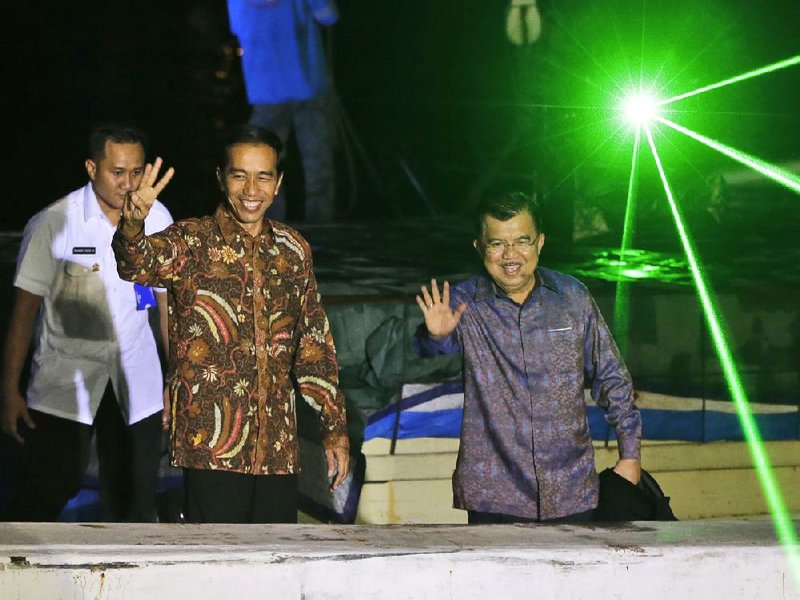JAKARTA, Indonesia -- Joko Widodo, the governor of Jakarta, was declared the winner of Indonesia's presidential election Tuesday, completing an improbable ascent from slum child to leader of the world's fourth most populous nation.
His opponent, Prabowo Subianto, a retired army general, rejected the results as fraudulent.
The General Elections Commission announced that Joko, with 53 percent of the vote, had beaten Prabowo, with 47 percent. Nearly 135 million Indonesians cast ballots in the July 9 election, in which voters chose a new president for the first time in 10 years.
There was a large police presence at the commission's offices in Jakarta, the Indonesian capital, on Tuesday as the vote tabulations were completed, amid rumors of violent street demonstrations by supporters of Prabowo.
As the elections commission was finishing its count and preparing to announce Joko the winner, representatives of Prabowo's campaign staged a walkout at the commission's office. Shortly afterward, Prabowo read a statement to supporters at his campaign headquarters saying he had withdrawn his candidacy and would reject the results.
"There has been a massive, structured and systematic fraud," Prabowo said.
But on Tuesday night, his brother and chief adviser, Hashim Djojohadikusumo, said Prabowo had not withdrawn his candidacy but was instead demanding more time for the elections commission to investigate "serious problems" in both ballot casting and vote tabulations.
Election officials rejected the allegations and said a candidate's withdrawal would have no bearing on the election results.
Hashim said Prabowo's campaign team had not yet decided whether to appeal the election results to the Indonesian Constitutional Court.
"We want the KPU to take a serious look at these irregularities," Hashim said, referring to the elections commission by its Indonesian abbreviation.
The Constitutional Court has the sole authority to order recounts or new voting at the provincial level and below, and its decisions are binding. The court has two weeks to issue any decision should there be an appeal. But analysts said it was highly unlikely that any ruling would overturn the final national result, given the 8 million-vote margin of Joko's victory.
Hours after the polls closed July 9, the results of quick counts conducted by well-established polling firms showed Joko with a lead of 4 to 6 percentage points. Prabowo, however, pointed to other firms, trusted by his campaign but dismissed as unreliable by a number of independent analysts, that put him ahead.
What amounted to declarations of victory by both camps led to weeks of uncertainty as the commission tabulated votes from more than 480,000 polling stations across the sprawling Indonesian archipelago. Prabowo's campaign said over the weekend that there had been widespread irregularities in the tabulations and had called for Tuesday's announcement to be delayed.
Joko is to be sworn in Oct. 20. He has pledged to bring more "people-centric" governance and policies to Indonesia, which, despite being a member of the G-20 group of major economies, has more than 100 million people living on $2 per day or less.
Joko, 53, was born and raised in a riverside slum area in Surakarta, also known as Solo, in Central Java province. He grew up to be a carpenter and later a furniture exporter before entering politics in 2005. He was twice elected mayor of his hometown, then governor of Jakarta in 2012.
Joko will be Indonesia's seventh president and the first not to have emerged from the country's political elite or to have been an army general.
Prabowo, 62, was a son-in-law of Suharto, the authoritarian president who was forced to resign in 1998 after 32 years in power amid pro-democracy street demonstrations.
Prabowo, a successful businessman from a prominent Javanese political family, has a checkered military record, including widespread allegations of human rights abuses as commander of Indonesia's Special Forces and later as head of the army's strategic reserve command. He was denied a visa to enter the United States in 2000 and is believed to remain on an unofficial blacklist.
Joko will lead a country that has successfully consolidated its democracy and enjoyed strong economic growth under the departing president, Susilo Bambang Yudhoyono, who has served two five-year terms and is constitutionally barred from seeking a third. Indonesia has had one of the fastest-growing economies in Asia in recent years, along with China and India.
A Section on 07/23/2014
